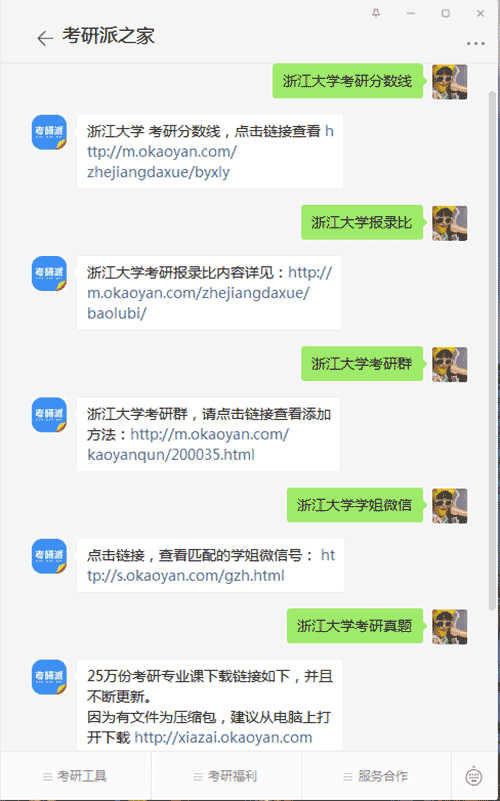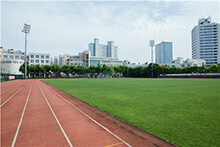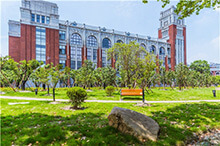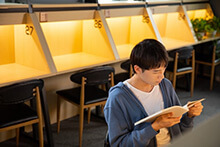Postgraduate Examination of World History of Zhejiang University

Text of postgraduate entrance examination for world history of Zhejiang University
World History Postgraduate Examination Subject of Zhejiang University
Experience sharing of Zhejiang University's postgraduate entrance examination of world history
Zhejiang University


Recommended reading
-

Animal Microbiology, a postgraduate examination subject of School of Animal Science, Zhejiang University in 2022 Name of examination subject: Animal Microbiology, code:, reference book: Veterinary Microbiology, edited by Lu Chengping, China Agriculture Press
Date: 09-08 Reading volume: 2873 -

In 2022, Zhejiang University School of Animal Science Master Examination Subject "Agricultural Knowledge" Name of examination subject: Comprehensive Agricultural Knowledge II, code:, reference books are as follows: Animal Genetics, edited by Zhao Xingbo, China Agricultural Publishing House, Animal Reproduction, edited by Yang Liguo, China Agricultural Publishing House, Animal Nutrition, Chen Daiwen, Yu
Date: 09-08 Reading volume: 23126 -

In 2022, Zhejiang University School of Animal Science Master Examination Subject "Veterinary Basics" Examination subject name: Fundamentals of Veterinary Medicine, code: The examination scope includes three parts: animal physiology, animal pathology and veterinary clinical diagnostics. Each part is scored. Candidates can choose two parts to answer. If all three parts are answered, the lower two parts will be scored
Date: 09-08 Reading volume: 2523 -

2021 Zhejiang University Master of Psychology Bibliography Title Author's publishing year Psychological Research Methods Shu Hua, Zhang Yaxu People's Education Press Psychometrics (the first edition) Dai Haiqi Higher Education Press Modern Psychology and Educational Statistics (the first edition) Zhang Houcan, Xu Jianping Beijing Normal University
Date: 12-25 Reading volume: 22358 -

2021 Zhejiang University Engineering Mechanics Research Deep Examination Outline The Examination Outline of Engineering Mechanics for the Master's Entrance Examination in (I) Analysis of Constraints and Forces on Some Objects in Statics Plane Intersecting Force System and Couple System Plane Arbitrary Force System and Plane Rigid System Balance Space Force System Sliding Friction, Rolling Friction, Balance with Friction (
Date: 12-18 Reading volume: 22870 -

2021 Zhejiang University Water Resources System Analysis and Research Deep Examination Outline Introduction to Water Resources System Analysis: Systems and Systems Analysis, Water Resources System and Water Resources System Analysis, Water Resources System Analysis Methods and Other Linear Programming and Their Applications: Overview, Mathematical Models of Linear Programming
Date: 12-18 Reading volume: 23417 -

2021 Zhejiang University Food Microbiology Research Deep Examination Outline Basic requirements: Food Microbiology is one of the important professional basic courses for majors such as food science and engineering. The focus of the entrance examination for master's degree candidates is to test and examine the candidates' basic knowledge of this course
Date: 12-18 Reading amount: 24501 -

2021 Zhejiang University Food Chemistry Postgraduate Examination Outline Introduction to the Examination Outline of Food Chemistry for the Master's Entrance Examination in; Research methods of food chemistry. Water content and water activity of water food; Type of water in food and interaction between water and solute; Water activity and food stability; Water
Date: 12-18 Reading volume: 23467 -

Entrance Examination of Historical Geography of Zhejiang University Historical Geography Postgraduate Entrance Exam Subject of Zhejiang University Political English I or Russian or Japanese or French History Foundation Historical Geography Postgraduate Entrance Exam Experience Sharing of Zhejiang University I School Choice: When it comes to choosing a school, I want to remind you that you must choose a school that is more balanced with your strength
Date: 02-06 Reading volume: 2107 -

Zhejiang University Graduate Examination of Chinese History Political English, a subject for postgraduate entrance examination in Chinese history at Zhejiang University, or the basis of Russian or Japanese or French history. I share my experience in postgraduate entrance examination in Chinese history at Zhejiang University. I want to remind you that when it comes to school selection, you must choose a school that is more balanced with your strength, like this
Date: 02-06 Reading volume: 2134 -

Entrance Examination of Basic Psychology in Zhejiang University Basic Psychology Postgraduate Examination Subject of Zhejiang University Political English One Psychology Major Basic Comprehensive Experience of Basic Psychology Postgraduate Examination of Zhejiang University I School Selection: When it comes to choosing a school, I want to remind you that you must choose a school that is more balanced with your strength, which
Date: 02-06 Reading volume: 2169 -

Graduate Examination of Applied Psychology in Zhejiang University Zhejiang University Applied Psychology Postgraduate Examination Subject Political English One Psychology Professional Foundation Comprehensive Zhejiang University Applied Psychology Postgraduate Examination Experience Sharing 1. School Selection: When it comes to choosing a school, I want to remind you that you must choose a school that is more balanced with your strength, which
Date: 02-06 Reading volume: 293 -

Postgraduate Examination of Atmospheric Science in Zhejiang University Political English for postgraduate entrance examination of atmospheric science in Zhejiang University One of the following groups can be selected: Group One: Three Dynamics of Mathematics Meteorology Group Two: Higher Algebraic Mathematical Analysis Experience of postgraduate entrance examination of atmospheric science in Zhejiang University
Date: 02-06 Reading volume: 2162 -

Entrance Examination of Geochemistry in Zhejiang University Geochemistry Postgraduate Examination Subject Political English of Zhejiang University I or Geoscience Basic Geochemistry or Organic Chemistry Experience Sharing of Geochemistry Postgraduate Examination of Zhejiang University I School Selection: When it comes to choosing a school, I want to remind you that you must choose one to compare with your strength
Date: 02-06 Reading volume: 254 -

Examination of Structural Geology in Zhejiang University Political English as the subject of structural geology postgraduate entrance examination in Zhejiang University I or Russian or Japanese geosciences basic structural geology I Experience sharing in structural geology postgraduate entrance examination in Zhejiang University I School selection: speaking of school selection, I want to remind you that you must choose one to compare with your strength
Date: 02-06 Reading volume: 2152 -

Textual research on mineralogy, petrology and mineral deposit of Zhejiang University The subjects of the postgraduate entrance examination in mineralogy, petrology and mineral deposit science of Zhejiang University Political English I or Russian or Japanese basic geosciences Rock mineral foundation or geochemistry Experience sharing in the postgraduate entrance examination in mineralogy, petrology and mineral deposit science of Zhejiang University I School selection: When it comes to school selection, I want to wake up
Date: 02-06 Reading volume: 2118 -

Examination of Quaternary Geology in Zhejiang University Quaternary Geology Postgraduate Examination Subject of Zhejiang University Political English I or Russian or Japanese Geoscience Basic Geography or Structural Geology Experience Sharing of Quaternary Geology Postgraduate Examination of Zhejiang University I School Choice: When it comes to choosing a school, I want to remind you that you must choose one
Date: 02-06 Reading volume: 2131 -

Zhejiang University Resource Environment and Regional Planning Postgraduate Examination Zhejiang University Resource Environment and Regional Planning Postgraduate Entrance Exam Subject Political English I or Japanese Geoscience Basic Geography Zhejiang University Resource Environment and Regional Planning Postgraduate Entrance Exam Experience Sharing I School Selection: When it comes to school selection, I want to remind you that we must choose one and you
Date: 02-06 Reading volume: 2177 -

Resource Exploration and Geophysical Examination of Zhejiang University Zhejiang University Resource Exploration and Geophysics Postgraduate Entrance Examination Subject Political English I or Japanese Mathematics II or Basic Geoscience Signal Digital Processing or Geophysics Basic Zhejiang University Resource Exploration and Geophysics Postgraduate Entrance Examination Experience Sharing I School Selection: When it comes to school selection, I
Date: 02-06 Reading volume: 2133 -

Entrance Examination of Remote Sensing and Geographic Information System of Zhejiang University Remote Sensing and Geographic Information System Postgraduate Entrance Examination Subject of Zhejiang University Political English I or Japanese Mathematics II or Cartography or Introduction to Remote Sensing Geographic Information System Remote Sensing and Geographic Information System Postgraduate Entrance Examination Experience Sharing I School Selection: When it comes to school selection, I want to remind you that
Date: 02-06 Reading volume: 296
































































